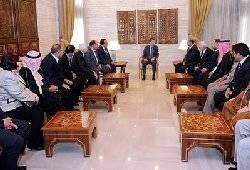The United States has imposed sanctions on Bashar al-Assad, the Syrian president, and six senior Syrian officials for human rights abuses over their brutal crackdown on anti-government protests.
The White House announced the sanctions on Wednesday, a day before Barack Obama, the US president, was to deliver a speech on the revolutions throughout the Arab world.
The sanctions are part of "an effort to increase pressure on the government of Syria to end its violence against its people and begin transitioning to a democratic system", a US official told the AFP news agency on the condition of anonymity.
In a letter to congressional leaders, Obama said he issued the new sanctions order as a response to the Syrian government's "continuous escalation of violence against the people of Syria".
Obama cited "attacks on protesters, arrests and harassment of protesters and political activists, and repression of democratic change, overseen and executed by numerous elements of the Syrian government".
The sanctions will freeze any assets Assad and the six Syrian government officials have in US jurisdiction and make it illegal for Americans to do business with them.
The six officials are: Vice President Faruq al-Shara, Prime Minister Adel Safar, Interior Minister Mohammed Ibrahim al-Shaar, Defence Minister Ali Habib Mahmud, military intelligence chief Abdul Fatah Qudsiya and Director of the Political Security Directorate Mohammed Dib Zaitoun.
On Wednesday, witnesses said the Syrian army resumed shelling of the western border town of Talkalakh for the fourth consecutive day. Syrians fleeing into Lebanon have said that the town has been besieged by security forces and that pro-government armed militias have been killing those deemed to be part of the protest movement.
In comments carried by the private al-Watan newspaper, President Assad admitted that the country's security forces had made mistakes in how they've dealt with the uprising, blaming poorly trained police officers.
He said that thousands of police officers were being given new training, and that the "crisis" was nearing an end. He blamed unrest on "foreign agitators and thugs".
Swiss sanctions
The US announcement of sanctions came as Switzerland also announced new sanctions against Syria on Wednesday, saying that it was following the European Union's lead in imposing an embargo on arms and equipment used for internal repression.
"The new edict on measures against Syria includes an embargo on military assets and equipment that could be used for internal repression," the Swiss economic ministry said in a statement.
"It also includes financial sanctions and travel restrictions on 13 people from the Damascus regime," it added.
The ministry said that through the new sanctions, "Switzerland is joining sanctions announced on May 9, 2011 by the European Union against Syria."
EU heavyweight Germany, meanwhile, is pushing for further sanctions against President Assad.
"Our demands are clear. Violence and repression against peaceful demonstrators must be stopped immediately," Guido Westerwelle, Germany's foreign minister, said.
Tighten sanctions
European governments agreed on Tuesday to tighten sanctions against the Syrian leadership, but said they would decide next week about whether to include Assad on the list.
The EU put 13 Syrian officials on its sanctions list in what it described as a move to gradually increase pressure.
Meanwhile, Dmitry Medvedev, the Russian president, said his country would not support any UN resolutions on the use of force against the Syrian government.
"As for a resolution on Syria, I will not support such a resolution even if my friends and acquaintances ask me about it," Medvedev told reporters during a rare news conference on Wednesday, arguing Syria must be allowed to settle its domestic affairs.
He did not specify what he meant, adding that such resolutions were open to interpretation.
Last month, Obama signed an executive order imposing a first round of US sanctions against Syria's intelligence agency and two relatives of Assad's for alleged human rights abuses.
PHOTO CAPTION
A picture released by the Syrian Arab News Agency (SANA) shows President Bashar al-Assad (C) meeting in Damascus with a delegation from the town of Daraa.
Al-Jazeera


 Home
Home Discover Islam
Discover Islam Quran Recitations
Quran Recitations Lectures
Lectures
 Fatwa
Fatwa Articles
Articles Fiqh
Fiqh E-Books
E-Books Boys & Girls
Boys & Girls  Ramadan
Ramadan Fatwa Audios
Fatwa Audios Month of Mercy
Month of Mercy Women
Women Eed Al- Fitr
Eed Al- Fitr Food Recipes
Food Recipes Videos
Videos

 Prayer Times
Prayer Times












